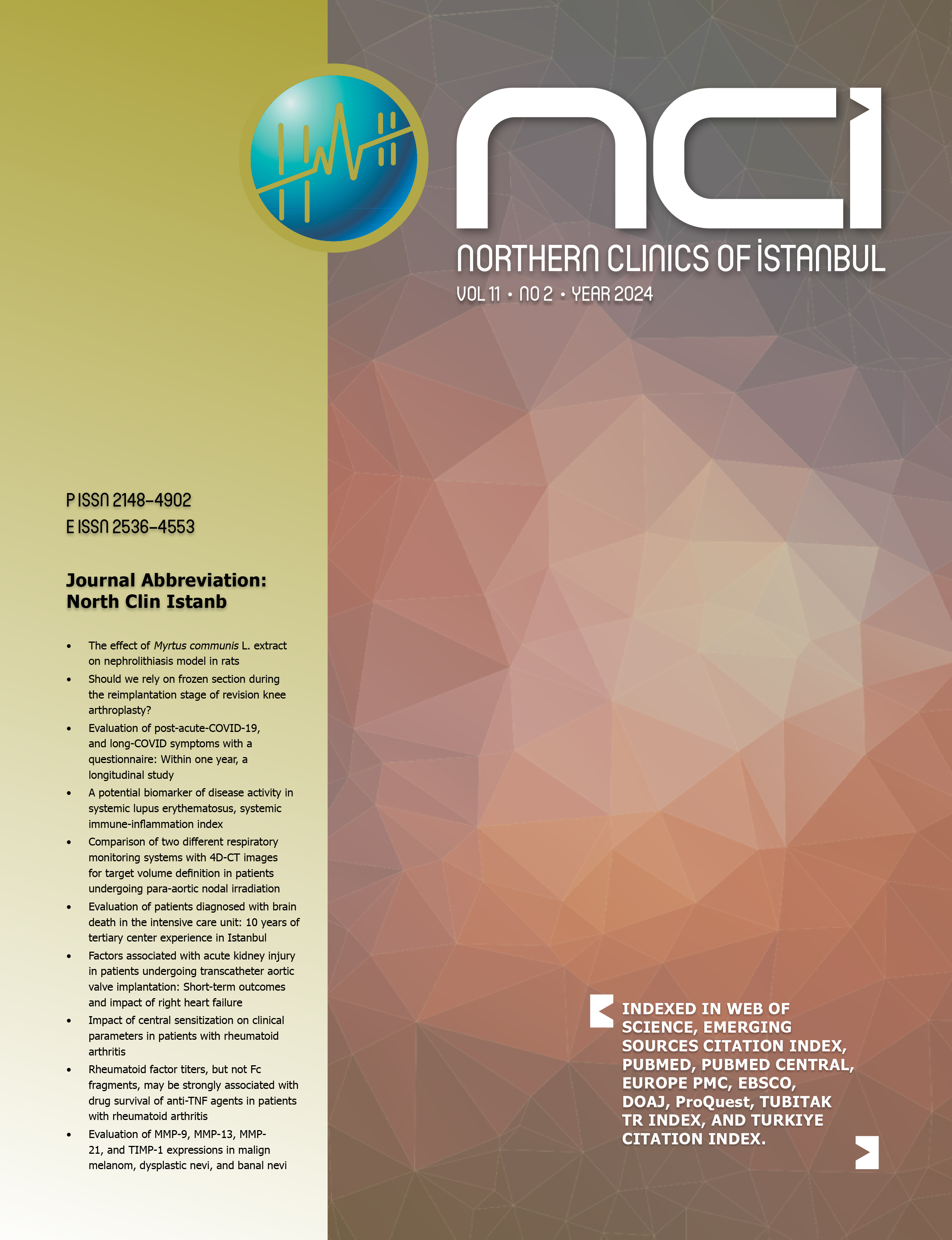Male breast cancer in a single-center experience: Diagnosis, clinicopathological features, and treatment strategies
Deniz Isik, Oguzcan Kinikoglu, Ezgi Turkoglu, Heves Surmeli, Neslihan BuyukmuratDepartment of Medical Oncology, University of Health Sciences, Kartal Dr. Lutfi Kirdar City Hospital, Istanbul, TurkiyeOBJECTIVE: Although breast cancer is the most common cancer type in women worldwide, it is a rare tumor in men, accounting for less than 1% of all male cancers. Therefore, the characteristics of the tumor, the management of the disease, and our overall survival data are quite limited.
METHODS: We retrospectively analyzed the data of 51 male patients diagnosed and treated for breast cancer, whose follow-up processes continue, at our hospital. We examined in detail the patients age, comorbid diseases, history of concomitant malignancies, family history, stage of the disease, tumor size, lymph node status, estrogen receptor (ER)/progesterone receptor (PR) along with Human Epidermal Growth Factor Receptor-2 (HER-2) status. Additionally, we analyzed the type of surgery, history of radiotherapy, and chemotherapy and hormonal treatments in the adjuvant and metastatic periods.
RESULTS: In our study, where we determined a median survival time of 122 months (29214), we found that the stage at diagnosis, Eastern Cooperative Oncology Group (ECOG) performance status, and discontinuation of adjuvant endocrine therapy significantly affected survival. While the median survival was not reached in stage 1 patients at diagnosis, the median survival times for stage 2, 3, and 4 patients were 118, 83, and 39 months, respectively. The differences between the groups were statistically significant (p=0.005). Similarly, the median survival was not reached for patients with an ECOG performance status of 0, but it was 84 months for those with a status of 1 and 98 months for those with a status of 2. The differences among these three groups were also statistically significant (p=0.001). The median survival was not reached for patients who completed adjuvant endocrine therapy, whereas it was 83 months for those who discontinued the therapy, with the difference being statistically significant (p=0.021). Besides these data, the presence of perineural invasion was found to be a factor close to statistical significance in terms of survival (p=0.066). Histological subgroups, grade, lymphovascular invasion, adjuvant chemotherapy, and Ki-67 were not significant parameters for survival.
CONCLUSION: Despite the differences in the stage at diagnosis, response to treatments, lower awareness of the disease, older age at diagnosis, and consequently, the increase in accompanying comorbid diseases, male breast cancer is managed according to studies and guideline recommendations for female breast cancer due to the lack of sufficient randomized studies. By presenting our clinical experience, we have emphasized the necessity for further studies in this field.
Keywords: Breast cancer survival; male breast cancer; rare; treatment.
Tek merkez deneyimiyle erkek meme kanseri: Tanı, klinik ve patolojik özellikler ile tedavi stratejileri
Deniz Isik, Oguzcan Kinikoglu, Ezgi Turkoglu, Heves Surmeli, Neslihan BuyukmuratSağlık Bilimleri Üniversitesi, Kartal Dr. Lütfi Kırdar Şehir Hastanesi, Tıbbi Onkoloji Kliniği, İstanbulAmaç: Meme kanseri dünya genelinde kadınlarda en sık görülen kanser türü olmasına rağmen erkeklerde nadir görülen bir tümördür ve tüm erkek kanserleri içinde <%1 orana sahiptir. Bu nedenle tümör karakteristiği, hastalığın yönetimi ve genel sağ kalım verilerimiz oldukça sınırlıdır.
Gereç-Yöntem: Merkezimizde meme kanseri tanısı ile tedavi almış ve takip süreçleri devam eden 51 erkek hastaya ait verileri retrospektif olarak inceledik. Hastaların yaşı, komorbid hastalıkları, eşlik eden malignite öyküsü, aile öyküsü, hastalığın evresi, tümör çapı, lenf nodu durumu, östrojen rseptörü(ER)/progesterone reseptörü(PR) ile beraber insan epitelyal büyüme faktörü-2 (HER-2) durumu detaylı bir şekilde incelendi. Aynı zamanda cerrahi şekli, radyoterapi öyküsü ile adjuvan ve metastatik dönemde kemoterapi ve hormonal tedaviler analiz edildi.
Bulgular: Medyan sağ kalım süresi 122 ay (29-214) saptadığımız çalışmamızda tanı evresi, Doğu kooperatif onkoloji grubu (ECOG) performans statüsü ve adjuvan endokrin tedaviyi bırakmanın sağ kalımı anlamlı derecede etkilediğini tespit ettik. Tanı anında evre 1 hastalarda medyan sağkalıma ulaşılamazken, evre 2, 3 ve 4 hastaların medyan sağ kalımı sırayla 118,83 ve 39 ay saptandı. Gruplar arasındaki farklar istatistiksel anlamlılık göstermekteydi (p=0.005). Benzer şekilde ECOG performans statüsü 0 olan hastaların da medyan sağ kalımına ulaşılamadı ancak 1 olan hastaların sağ kalımı 84, 2 olan hastaların ise 98 ay olduğu görüldü ve yine üç grup arasında istatistiksel anlamlı farklılık tespit edildi (p=0.001). Adjuvan endokrin terapiyi tamamlayan hastaların da medyan sağ kalımına ulaşılamadı ancak tedaviyi tamamlamadan bırakan hastaların medyan sağ kalımı 83 ay idi aradaki fark istatistiksel anlamlıydı (p=0.021). Bu veriler dışında perinöral invazyon varlığı istatistiksel anlamlılığa yakın (p=0.066) olarak sağ kalım açısından bir faktör olarak saptandı. Histolojik alt grup grup, grade, lenfovasküler invazyon, adjuvan kemoterapi ve Kİ-67 ise sağ kalım üzerinde anlamlı birer parametre olarak saptanmadı.
Sonuç: Erkek meme kanseri tanıdaki evresi, tedavilere yanıtı, hastalık ile ilgili genel farkındalığın azlığı, daha ileri tanı yaşı ve buna bağlı eşlik eden komorbid hastalıkların artışı gibi farklılıklara rağmen yeterli randomize çalışmaların eksikliği nedeni ile kadın meme kanseri çalışmalarına ve kılavuz önerilerine göre yönetilmektedir. Kliniğimizdeki deneyimimizi sunarak bu alanda yapılacak ileri çalışmaların gerekliliğini vurgulamış olduk. (NCI-2024-6-7)
Anahtar Kelimeler: Meme kanseri sağ kalımı; erkek meme kanseri; nadir; tedavi.
Manuscript Language: English





















